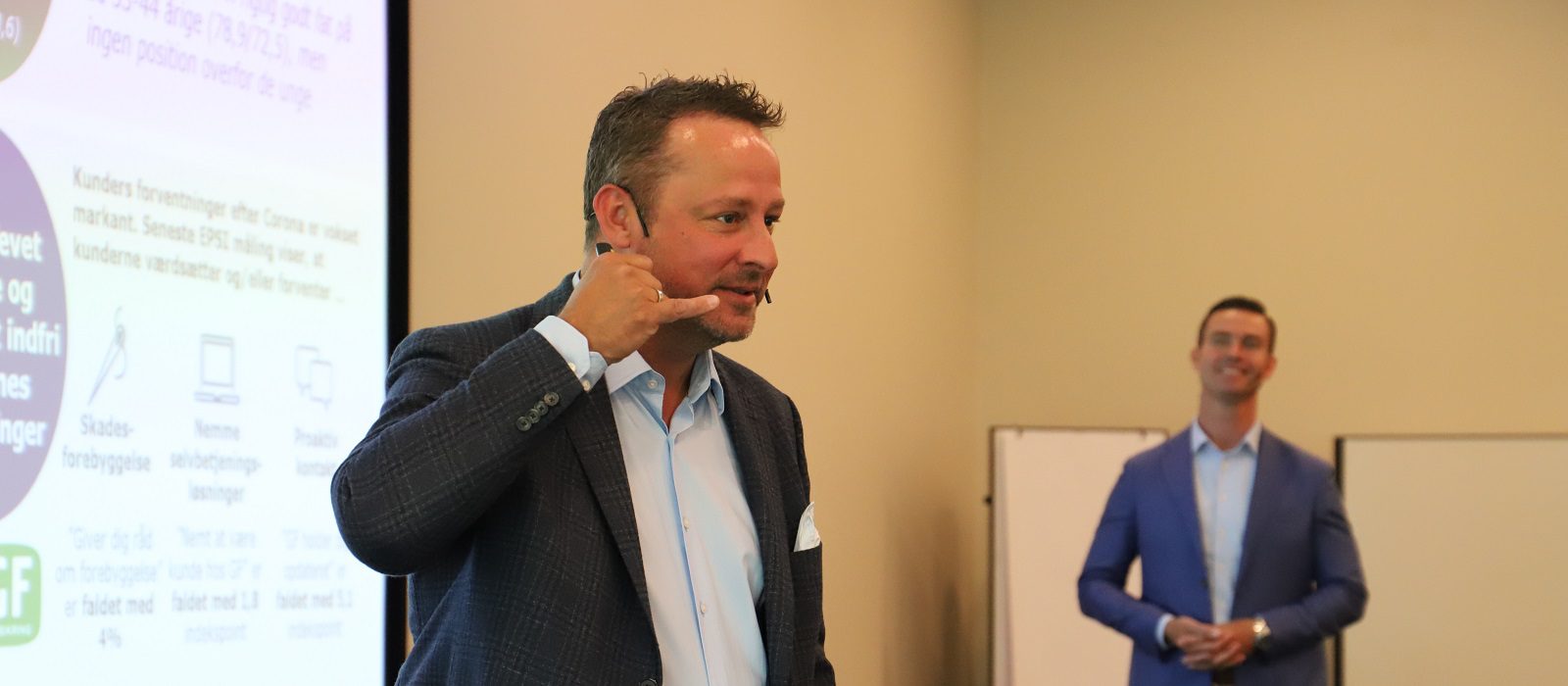Last year, I was invited to represent ICMIF at the Association of Financial Mutual’s (AFM) Annual Conference, to share some examples of best-practice from mutual/cooperative insurers across the globe with an audience of leaders from the UK’s mutual insurance and friendly society sector.
During the opening address of the event, the AFM Chair spoke of the “say-do” gap which he believes exists in the financial services industry – a distinct gap between what organisations say they do or are going to do, and what they actually do. He then referenced a comment from a consultant who, at a previous AFM event, had observed that he believed the opposite was in fact true for the mutual sector: that mutuals do much more than they say they do: a “do-say” gap.
That was the challenge to kick-start the Conference: for AFM members to be more active and articulate the positive impact they have in serving customers, communities and society across the UK. This was also the perfect introduction for my presentation which showcased some examples of how mutual/cooperative insurers across the world are communicating the unique benefits and differentiation of mutuality in a way that builds on their historic values and heritage, but is articulated in a way that resonates with today’s consumers.
Defining a modern mutual
In recent years, ICMIF has hosted numerous virtual roundtables for strategy leaders and webinars on topics of mutuality and business transformation. This has enabled us to collate many best-practice case studies on what member organisations are doing to strategically position the mutual value proposition to create a competitive advantage in their local markets; as well as how members are leveraging their purpose and values at the core of strategic transformation to become truly customer-centric, digitally-led and sustainable organisations.
From this, we have been able to define some common aspects that leading mutual/cooperative insurers use as a competitive differentiator for purpose-driven growth and to transform into a “modern mutual”. These can be summarised as:
- Having a clear and meaningful purpose that goes beyond profit, and developing a strategy and collaborative culture that aligns with this.
- Focusing on making a positive impact on communities and society – yet also understanding that they need to be financially sustainable. Financial goals are driven by purpose, not only maximising profits.
- Utilising technology to continue to hold strong personal connections with policyholders, but offer enhanced and tailored services to them.
A global view of the modern mutual
Presenting six case studies from leading mutual/cooperative insurers across the world provided a global view on what some ICMIF member organisations are doing to transform themselves into a modern mutual. Through marketing campaigns and corporate promotional videos, these companies are effectively illustrating and communicating the unique benefits and value of the mutual model to their target markets.
Click on the links below to be directed to some of these videos/campaigns. ICMIF members can also access more information on each case study through the ICMIF Knowledge Hub (see below)
FMG (New Zealand)
Mutuality has always played a crucial role in shaping FMG’s customer-centric approach, fostering strong community engagement, and driving their commitment to sustainability and social impact. Personalisation through advice is what makes it different as an insurer; but it is FMG’s mutuality that makes it distinctive as a brand. Its recent marketing campaign The feeling’s mutual highlights the distinct nature of the mutual brand and reflects their commitment to serving rural New Zealand and providing a better deal for their clients, aligning with their core purpose and vision.
FMG has also invested in digital channels to complement its relationship model, not wanting to erode the personal level of interaction, but complement and enhance this – helping it to become more efficient and achieving a Net Promoter Score (NPS) of more than 60%.
MAS (New Zealand)
Founded to serve doctors and medical professionals, MAS went through significant change in 2019 by converting into a charitable organisation, helping it to make a real difference in society as it was better able to share it profits related to its purpose to inspire a healthier New Zealand. MAS is now looking to expand its membership beyond the medical community, and mutuality is central to its purpose-driven growth strategy.
Customer intimacy previously provided the key differentiator for the mutual, as it strived to provide an outstanding level of service to their members. Today, with the emergence of the “conscious consumer” in New Zealand, its purpose and alignment of values are the key factor in appealing to this new market. MAS marketing has centred around this idea of being “driven by purpose, not by profit”.
PPS (South Africa)
As one of only two life mutuals in South Africa, PPS is fully behind the idea that the ethos of mutuality sets it apart. One unique feature that it offers is Profit-Share, whereby member-policyholders with qualifying products are allocated a share of the annual profits into their Profit-Share accounts. This supports PPS’s tagline that Success is better shared.
PPS also regularly promotes the fact that many members’ Profit-Share accounts have exceeded the total premium they paid in, and that they have created more than 10,000 Profit-Share millionaires (members with more than ZAR 1 million in their accounts).
Recently, PPS has really leveraged the idea that mutuality makes membership meaningful, offering members a range of lifestyle benefits through a new digital member engagement platform – where they can access their Profit-Share account and get extra bonuses. PPS also offers a cross-holding booster, where members with qualifying products who hold up to three PPS subsidiary and affiliate products get extra booster benefits, to encourage customer loyalty and a 15-30% booster when they add another qualifying product from PPS in life or general insurance.
Gore Mutual (Canada)
Beginning in 2020, Gore Mutual launched an ambitious 10-year transformation plan to more than double in size and grow the company into a purpose-driven, digitally-led national insurer.
Despite being more than 180 years old, it continues to embrace its heritage and roots at the company; but it also recognised that it needs to modernise as an organisation to executive its transformational growth plans. The principles of mutuality are a strong pillar of this transformation, and it has invested in the elements of mutuality that give it an advantage.
Gore Mutual is committed to bringing its purpose to life through a framework that consists of be good (do business the right way); do good (provide customers with more value); and spread good (have a positive impact). It recent launched a refreshed brand identity around this virtuous circle of good: built on its legacy and history, but reflecting its ambition to scale as a modern mutual insurer.
Royal London (UK)
As a key focus of its role as a modern mutual, Royal London wants to grow sustainably and deepen customer relationships with all stakeholders by putting its customers and clients at the heart of everything it does. Mutuality enables Royal London to drive change in the areas that it can influence by embedding its purpose of Protecting today, investing in tomorrow. Together, we are mutually responsible across every area of the business. The mutual launched a refresh brand strategy called It’s everyone’s business, changing its visual identity with a new photographic library to convey itself as a modern mutual.
This was brought together in a campaign called Together for good, a campaign to protect the standards of living for this and future generations that aligns to being mutually responsible, helping Royal London tell a story through its brand work and all of its activities around the mutual’s role in society with a long-term aim to show customers how they are making change.
Achmea (Netherlands)
Achmea has a 200 year history, but still keeps its cooperative identity at the centre of its strategy to create sustainable value for its customers, employees, company and society. It looks to solve major social issues together with customers, focusing on four domains: health, living and working, mobility and income.
In 2021, it launched a new purpose: Sustainable living, together. In order to promote its purpose to customers and other stakeholders, Achmea commissioned a corporate film, which has since gone on to win numerous awards. The five storylines represent the different brands and domains Achmea is active in. Despite the individual stories, the video highlights the essence of individuals coming together as collective – and in Achmea’s case, all 13 million customers – to protect each other.
Successful marketing and brand strategy best-practice across ICMIF’s global network
These six case studies are just some examples of best-practice from ICMIF members in terms of how they are marketing and communicating the unique values of mutuality and leveraging their mutual/cooperative heritage in their approach to modernise for the future.
They share some common characteristics in how to communicate the benefits of a modern mutual:
- Purposeful impact: Clearly communicating a meaningful purpose that goes beyond maximising profits, and focusing on positive impacts for all stakeholders. This purpose-driven approach distinguishes them as businesses with a broader societal mission.
- Member-centric excellence: The benefits of a modern mutual lie in prioritising members’ interests and needs, ensuring products, services, and strategies align with well-being, expectations, and satisfaction. This member-centric focus enhances the overall customer experience.
- Collaborative culture: Communication emphasises a culture of collaboration, service excellence, and inclusivity. Modern mutuals involve customers, employees, and stakeholders in decision-making processes, fostering a sense of community and shared responsibility.
- Ethical and transparent practices: Modern mutuals communicate responsible governance and ethical behaviours as key principles. Transparent practices foster trust, democracy, and accountability, distinguishing them as insurers committed to ethical conduct.
- Sustainability and innovation: Communication highlights a commitment to long-term sustainability over short-term gains. Modern mutuals showcase their adaptability and innovation, embracing change to meet evolving member needs, societal challenges, and expectations while staying true to core values.
To learn more about any of the above case studies or request a copy of the full presentation please get in touch.
ICMIF recently launched a new Brand and Marketing Forum aimed at any brand, marketing, communications or strategy professional at ICMIF members looking to be inspired, share and broaden their own knowledge, while establishing a global peer network to learn and collaborate with. The first session in this new series will take place on Tuesday 5 March 2024 (2pm-4pm GMT / UK time) and each meeting will feature case studies of how mutual/cooperative organisations articulate and communicate their unique difference through marketing campaigns and brand experience. The Forum will also provide a platform for brand and marketing experts to discuss emerging trends, exchange experiences to overcome common challenges, and explores areas that members can collaborate to strengthen the voice of our sector.






